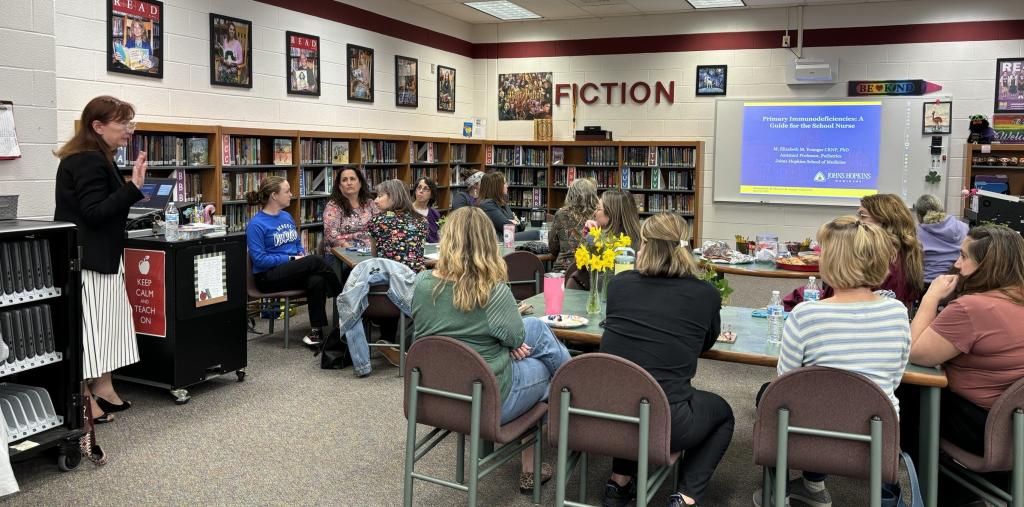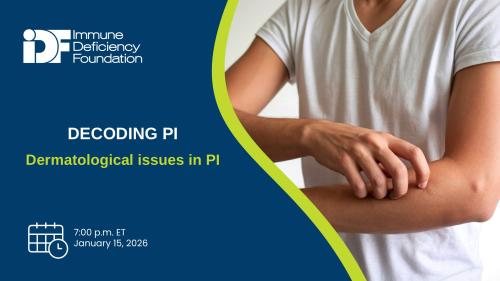
-
Understanding primary immunodeficiency (PI)

Understanding PI
The more you understand about primary immunodeficiency (PI), the better you can live with the disease or support others in your life with PI. Learn more about PI, including the various diagnoses and treatment options.
-
Living with PI
-
Addressing mental health
-
Explaining your diagnosis
- General care
- Get support
- For parents and guardians
-
Managing workplace issues
- Navigating insurance
-
Traveling safely

Living with PI
Living with primary immunodeficiency (PI) can be challenging, but you’re not alone—many people with PI lead full and active lives. With the right support and resources, you can, too.
-
Addressing mental health
-
Get involved

Get involved
Be a hero for those with PI. Change lives by promoting primary immunodeficiency (PI) awareness and taking action in your community through advocacy, donating, volunteering, or fundraising.
-
Advancing research and clinical care
-
Research Grant Program
-
Consulting immunologist
-
Diagnosing PI
-
Getting prior authorization
-
Clinician education
-
Survey research
-
Participating in clinical trials

Advancing research and clinical care
Whether you’re a clinician, researcher, or an individual with primary immunodeficiency (PI), IDF has resources to help you advance the field. Get details on surveys, grants, and clinical trials.
-
Research Grant Program

For children with undiagnosed primary immunodeficiency (PI), the school nurse can serve as a gateway to the discovery of the condition, and for those students already diagnosed, the school nurse plays a critical role in their care.
To spread awareness of PI and inform school nurses of how important they are in the lives of children with PI, Dr. Beth Younger, a pediatric nurse practitioner, assistant professor of pediatrics at Johns Hopkins School of Medicine, and long-time member of the Immune Deficiency Foundation’s (IDF) Nurse Advisory Committee (NAC), visited the School Nurses Association of Carroll County in Maryland and provided a presentation on PI for their annual education meeting.
“They were riveted. I’ve never spoken to a group that was so excited and attentive. They were interested and engaged and had lots of questions,” said Younger, who spent the evening educating about two dozen nurses. “My goal was to get them thinking of PI. Everyone thinks it’s this rare diagnosis, and the reality is it’s out there, and if you look, you will find it.”
Younger took special care to define PI and explain the 10 warning signs of PI in children, as described by the Jeffery Modell Foundation (JMF), another advocacy organization dedicated to supporting persons with PI. Consider the child with chronic, recurrent, severe, and unusual infections who may also have autoimmune issues like inflammatory bowel disease, type 1 diabetes, rheumatoid arthritis, and autoimmune cytopenia, in which the immune system attacks healthy blood cells, Younger told the school nurses.
Younger pointed out that the school nurses won’t act as diagnosing clinicians but rather as a bridge to parents in starting the conversation about the possibility of PI.
“They wanted to know what to say to parents, and I told them just explain the red flags like continually missing school three times a month or kids with constant fever, runny nose, and a wicked cough. Things that are that simple. The longer you are in practice, the more gestalt for this you develop. You understand this is not quite normal, this is something outside the spectrum. Maybe something else is going on,” said Younger.
“Just talk to a mom and say, ‘Wow, this kid is sick a lot. Has anyone thought about why that might be?’ No one’s committing to a long-term conversation about it; just make them aware of the pattern and discuss the warning signs.”
Younger reviewed types of PI, including common variable immune deficiency (CVID), with the nurses. About 20% of patients with CVID are diagnosed under the age of 16, she told the school nurses, and they often develop sinus infections, have a predisposition for autoimmune diseases, and have a higher incidence of lymphoid cancers. She also touched on more rare PIs like severe combined immunodeficiency (SCID), chronic granulomatous disease (CGD), and Wiskott-Aldrich syndrome (WAS), as well as X-linked agammaglobulinemia (XLA), and complement deficiencies.
Younger reviewed treatments, described symptoms such as fever that could mean a medical emergency for a child, and discussed the implications of vaccines on children with antibody deficiencies (such as with CVID and SCID), complement deficiency or a missing spleen, and phagocytic dysfunction (such as with CGD).
“There are specific things to look out for with specific diseases. Make sure you know what the plan is and what they need to be aware of. Very frequently, I’ll write letters to principals and let them know that they have a child with a PI and describe the ramifications. Sometimes, it’s a sit-down meeting with the school, sometimes, it’s a letter, but we all have to be on the same page. Everyone needs to know what it looks like, and the school nurse is part of that conversation,” said Younger.
Younger advised the nurses that when caring for a child with PI, it’s imperative to:
- Never administer a vaccine or treatment without a parent or guardian’s permission.
- Understand the implications of the diagnosis, including precautions for the child and what concerns need immediate reporting.
- Establish a therapeutic relationship with the child and their parents or guardians.
- Determine a communication link with parents or guardians about issues like illnesses at school; know the best route of contact and who to contact.
- Discuss with parents or guardians if they want other students or parents to know about their child’s PI.
- Monitor environmental accommodation if needed.
Carroll County elementary school nurse Jeanne Patterson, mother to an 18-year-old son with PI who participated in an IDF Teen Escape, helped coordinate the presentation. School nurses handle everything from everyday boo-boos to chronic conditions for students, said Patterson. They participate in medical plans and accommodations and educate staff on classroom cleanliness and childhood illness. Patterson understands the role a school nurse serves in raising the index of suspicion for PI and in supporting kids in the school environment post-diagnosis.
“I know the nurses felt very informed about PI after the presentation, and it helped them think differently about children who are ill a lot,” said Patterson. “It also served as a good reminder to keep the lines of communication open with parents.”
Get a school kit
Be prepared to support a zebra with our free education kit for schools:
- Patient & Family Handbook.
- THINK ZEBRA poster to hang in the health room.
- School Guide for Students with Primary Immunodeficiency.
- Guide for Young Adults.
- An IDF brochure.
Related resources
Sign up for updates from IDF
Receive news and helpful resources to your cell phone or inbox. You can change or cancel your subscription at any time.





The Immune Deficiency Foundation improves the diagnosis, treatment, and quality of life for every person affected by primary immunodeficiency.
We foster a community that is connected, engaged, and empowered through advocacy, education, and research.
Combined Charity Campaign | CFC# 66309




